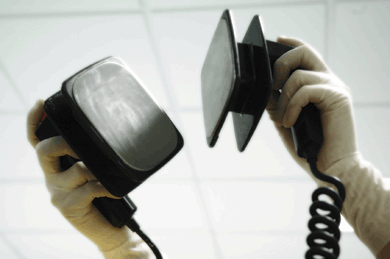
The question comes up a lot, how big a real estate deposit is needed to hold the property?
The one the out of state buyer really is interested in but can not just drop everything to trot up the pike to see it in person. That is one reason we shoot, edit, upload real estate videos so there is not lacking the show and tell property information that makes it necessary to do the expensive travel. Each time something good comes up for the property buyer to consider one by one spaced out over time. 
Holding the property is not in the best interest of the seller of real estate.
Because someone else that is ready to buy is held off until the out of town, gotta come see it buyer gets here and decides to buy or not. With a deposit, a signed contract contingent upon personal inspection it creates a log jam stop on the marketing availability of the listing. Until he decides to buy or not. And you the agent can scream “Next”.
He may never get here. Or come up and decide this is not something he will buy. Or he likes the property but not what is around it or the community where it is located that takes time when the property is put on hold while he clears his schedule to check it all out.
Plane tickets, paying for motels, the tolls traveling and eats on the road. They all cost money and take time out of a person’s life. We get that but put anything on layaway, telling future buyers the place has a hold on it. Hurts the seller. That is not what other buyers in line want to hear and they don’t hang around wasting precious time on property that may or may not be sold.
Lost opportunities to selling happen when a previous buyer who was not ready to becomes in a position to proceed with a purchase.
But is held off because someone has a first right of refusal to buy. So taking a deposit contingent on a long time getting here or a slew of contingencies is not the wise course of action. Because this buyer has loose ends, is not ready, willing and able to buy today.
So back to the size of the real estate deposit, how big it should be when the buyer wants to purchase but say the property sale is contingent upon bank financing.
Again, delay in the sale for any reason is costly. The bank financing the mortgage if a local one will tie up the seller and buyer less time because the local agent can push the sale along. Can know what is the delay and make sure all the parties are working toward that all important real estate closing. With the far from your state processing mortgage loan banking center, no one knows for sure why weeks are flying by with nothing seemingly happening to make the sale pending listing evolve into a sold one. 
The deposit is earnest money put down to show good faith, consideration that proves the intent of the buyer as very serious.
That he intends to buy if a few things check out. Like clear title to the real estate, and inspections to find nothing covered up that will come back to bite him in the keester after the real estate sale.Where it becomes his problem to iron out.
The deposit paired up with the signed purchase and sale agreement is not a down payment.
The earnest money deposit on the real estate is something that could be lost if the buyer does not exercise his option to buy. Or that gets returned if any of the contingencies outlined in the real estate contract to purchase don’t pan out the way he expected. And the property get returned to the market of current available listings in the MLS inventory.
In many markets, the size of the real estate earnest money deposit is $500 to $1000.
Especially in low to the ground priced rural real estate markets. But when the prices on the listings have a lot more zero places used, the size of the deposit heads skyward. Like the extra players in the layers used to list, twist, sell in bigger urban areas.
Putting the entire purchase price down as a deposit will show loud and clear you the buyer have the money, putting it where your intent is.
To buy this property for this much money just parked and waiting for a closing. If you the seller just sign the legal paperwork of contract, then the deed for the conveyance. Cut to the chase, nothing held back with a full cash purchase price deposit. It removed all doubt can you get the money, do you have the money to do what you say you are thinking of doing?
Money talks and no dilly dally waiting around is how you the buyer do business. Send that signal if you want the seller’s full attention by putting all the cards on the table, fanning the $100 bills in a big array to flash the cash dramtically.
Buying time is what the deposit does and the less time needed to clear the real estate hurdles, the less important the size of the deposit matters. Sizes does always send a signal to the seller who is placed in the position to put the property under contract or not. But lots of other factors have to be considered by both the buyer and seller to make a match that works for both. Or knowing a compromise is best arrived at when neither buyer or seller is handstand happy but work together to make concessions to have a successful real estate closing.
The deposit put down on the property to send the signal to the seller, to the world I am buying this piece of real estate is made at time of signing. Or some agreed upon date to provide time for the wire transfer or snail mail delivery. Extra deposit can be added to the contract terms as extensions are needed becuase of closing delay. Like money in a parking meter to buy time, the earnest money real estate deposit on property may need to be fed to keep the seller’s interest as it lingers off the market waiting for the clear to close memo.
The size of the deposit is less important than the strings attached to it.
I would rather see a small deposit for a simple cash sale closing in the next two weeks with no contingencies other than clear title than a big deposit on a sale with all kinds of red flags attached to it. Keep it simple applies in life, especially in real estate. 
Lots of hurdles like the buyer having to sell another out of state home not even on the market yet or getting a job paying so much in small rural Maine are big “if’s” in a real estate sale.
Books will say in certain large urban areas the norm is this or that tied to the percentage of the real estate property sale price. But fighting over a deposit if the sale does not happen involves lawyers, delays with court house step climbing. And you the seller really want to sell the property.
Not arm wrestling over the real estate deposit on a failed property sale.
Don’t take any size deposit if the list of contingencies are unreasonable or doomed for failure. It can be held in the trust account of the buyer or seller’s agent if there are two sides to the transaction. In small rural markets, the majority of real estate sales are the listing broker is the selling agent and the deposit is placed in the non interest bearing trust account at the bank of his choice.
Interest bearing trust account deposits can happen with the buyer and seller agreeing the interest goes to whichever party. This happens when the deposit is large, the delay in closing long by design.The interest from a trust account real estate deposit is not the broker or agents to benefit from personally.
Too one sided a real estate deal and someone is going to have their expectation bubble burst no matter how big a deposit. Who wants to use a large chunk of change as a buyer if they don’t have to? Money comes hard for buyers and sellers and liquidated deposits help the sting. But the seller wants a sale, not the deposit usually. 
Lawyers can split hairs and tie up the sale and due to the larger the size of the money put down to wrangle over.
That puts the seller’s life on hold and messes up another sale because the last one is not put to bed with a release to someone. A split of the deposit can happen and small claims courts have been used by this broker to get direction from a judge when the buyer and seller are in a stalemate. And neither is going to send the other a Christmas this or any future year.
When there are title issues to resolve, an estate that needs probating and family feuds are heating up, those loose ends need to be resolved before the property is marketed. The same holds true when the buyer is not ready to purchase or has credit to repair that takes time. Time is money, delays are costly.
A dollar down shows a seller how interested the buyer is. Or that he lacks buying hosepower. For a earnest money deposit used to tell the owner to take it off the market, size matters.
A big deposit shows you have the money and mean business. That you are not afraid to put your money where your written offer is typed out and presented to the owner for consideration. 
To be on the safe side, make sure the purchase agreement covers how a refund would be handled if the sale derails.
Who is holding the deposit and when it is presented to deposit if not at the time of signing the contract.
That trust account where the deposit is placed and then the funds taken to the real estate closing is sacred. Nothing is more important to protect than that security deposit that is not the sellers, not the broker or agents. And is sitting in limbo with usually contingencies to meet before it gets applied to the purchase price and or closing costs due at the formal sit down paper transfer with all the signatures needed here, here and also here.
The buyer who does not elect to purchase because of a home inspection that they did not like the looks of expects to get that money put down in good faith back pronto. For it over Sport.
But it is not so fast. Unless the seller has a better buyer in the wings that serves their needs better. The seller usually wants to look over the report and determine was the reason just the building report and are the property owners given a chance to correct whatever is amiss. And so the property does not get a reputation as a problem one that keeps it from getting financing. When nothing is wrong except the buyer changed their mind on buying it because of a divorce, lost job or just found something better that is new to the market since falling in love with the last house he thought he was buying.
It is tempting to hope all the contingencies will line up perfectly like the planets who know their orbits.
But the more layers of this, this and this has to happen before a sale can move forward just dims the chances of a real estate sale actually happening.
The real estate seller can be given the deposit directly if the contract spells out that procedure up front in the fine print.
This is done when the buyer is forced to or is getting some benefit prior to the actual sale. Like storing his furniture at the property and avoiding costly delay in moving it twice or more times. Or early possession and rental can be done but is not advised in most cases.
Is the seller ready to sell, the buyer in a position to purchase today? And if not quite, how long is it going to take to fix whatever is causing the delay? Answers to all that determine what an appropriate earnest money deposit is required. It is never one size fits all for how big a real estate deposit is needed. And holding the property for any reasons is dangerous.It is tempting but not always wise to accept if the chances of a sale are too up in the air and loose as a goose.
Nothing is better than cash for a sale that can close today if need be.
A dollar down can be all that is needed when 100 percent financing is the only option available for the real estate buyer. But not if that lonely George Washington portrait is used to buy a home with lots of repairs needed and a buyer and seller with no means to make them to secure a bank underwriters loan approval for the purchase and sale of a home in Maine.
I’m Maine REALTOR Andrew Mooers, ME Broker
207.532.6573 | info@mooersrealty.com |
MOOERS REALTY 69 North Street Houlton Maine 04760 USA
